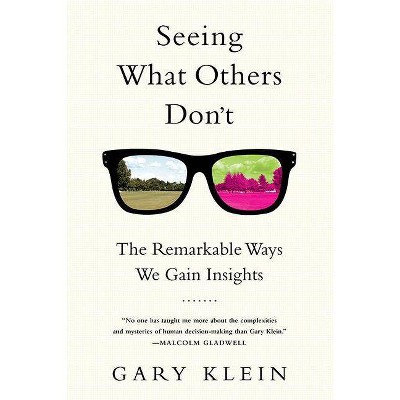Seeing What Others Don't - by Gary Klein (Paperback)

Similar Products
Products of same category from the store
AllProduct info
<p/><br></br><p><b> About the Book </b></p></br></br>Originally published in hardcover in 2013 by PublicAffairs.<p/><br></br><p><b> Book Synopsis </b></p></br></br>Insights -- like Darwin's understanding of the way evolution actually works, and Watson and Crick's breakthrough discoveries about the structure of DNA -- can change the world. We also need insights into the everyday things that frustrate and confuse us so that we can more effectively solve problems and get things done. Yet we know very little about when, why, or how insights are formed -- or what blocks them. In <i>Seeing What Others Don't</i>, renowned cognitive psychologist Gary Klein unravels the mystery. <p/> Klein is a keen observer of people in their natural settings -- scientists, businesspeople, firefighters, police officers, soldiers, family members, friends, himself -- and uses a marvelous variety of stories to illuminate his research into what insights are and how they happen. What, for example, enabled Harry Markopolos to put the finger on Bernie Madoff? How did Dr. Michael Gottlieb make the connections between different patients that allowed him to publish the first announcement of the AIDS epidemic? What did Admiral Yamamoto see (and what did the Americans miss) in a 1940 British attack on the Italian fleet that enabled him to develop the strategy of attack at Pearl Harbor? How did a smokejumper see that setting another fire would save his life, while those who ignored his insight perished? How did Martin Chalfie come up with a million-dollar idea (and a Nobel Prize) for a natural flashlight that enabled researchers to look inside living organisms to watch biological processes in action? <p/> Klein also dissects impediments to insight, such as when organizations claim to value employee creativity and to encourage breakthroughs but in reality block disruptive ideas and prioritize avoidance of mistakes. Or when information technology systems are dumb by design and block potential discoveries. <p/> Both scientifically sophisticated and fun to read, <i>Seeing What Others</i> Don't shows that insight is not just a eureka! moment but a whole new way of understanding.<p/><br></br><p><b> Review Quotes </b></p></br></br><br>A valuable resource for business professionals to return to over again--<i><b>Library Journal</b></i><br><br>Brilliant discourse on a fascinating subject. It's written in a crisp, fluent, Gladwellish way and the pages flit by--<i><b>Management Today</b></i><br><br>Gary Klein pins down what until now has been the elusive topic of insight in his best and most personal work yet. The examples are memorable and Klein translates them into subtle and powerful lessons for practitioners and academics alike.--<i><b>Karl Weick, Rensis Likert Distinguished University Professor, Emeritus, University of Michigan</b></i><br><br>Gary Klein's brilliant book is a superb analysis of why and how some people are able to understand things others do not. As one of Gary's students and disciples I can attest to the exceptional value his insights have added to my own leadership and decision making ability. This new book is a must read for all leaders and should be added to his other works as the definitive collection on how decisions are, and should be, made.--<i><b>General Anthony C. Zinni USMC (Retired)</b></i><br><br>His analysis of how Google searches and corporate culture inhibit insight is intriguing, while suggestions for improving the chances of having a breakthrough are practical and useful for many facets of life<br>--<i><b>Publishers Weekly</b></i><br><br>Intriguing findings that should play a transformative role, not only in the field of psychology, but also in corporate boardrooms.--<i><b>Kirkus Reviews</b></i><br><br>No one has taught me more about the complexities and mysteries of human decision-making than Gary Klein.--<i><b>Malcolm Gladwell</b></i><br><br>Written in a breezy yet informative conversational style, <i>Seeing What Others Don't </i>is a good read and helps to stimulate our own thinking about how insights occur--<i><b>Strategy & Leadership</b></i><br><p/><br></br><p><b> About the Author </b></p></br></br><b>Gary Klein, PhD</b>, a senior scientist at MacroCognition LLC, was instrumental in founding the field of naturalistic decision making. Dr. Klein received his PhD in experimental psychology from the University of Pittsburgh in 1969. He spent the first phase of his career in academia and the second phase working for the government as a research psychologist for the U.S. Air Force. <p/> The third phase, in private industry, started in 1978 when he founded Klein Associates, a research and development company that had grown to thirty-seven employees by the time he sold it in 2005. He is the author of <i>Sources of Power: How People Make Decisions; The Power of Intuition; Working Minds: A Practitioner's Guide to Cognitive Task Analysis</i> (with Beth Crandall and Robert Hoffman); and <i>Streetlights and Shadows: Searching for the Keys to Adaptive Decision Making</i>. Dr. Klein lives in Yellow Springs, Ohio.
Price History
Price Archive shows prices from various stores, lets you see history and find the cheapest. There is no actual sale on the website. For all support, inquiry and suggestion messages communication@pricearchive.us



















